Di Forum Internasional, Pupuk Indonesia Gaungkan Kolaborasi Jadi Kunci Wujudkan Ketahanan Pangan

Denpasar, 24 April 2025 - PT Pupuk Indonesia (Persero) menegaskan perannya sebagai aktor strategis dalam menjaga ketahanan pangan nasional dan regional melalui partisipasi aktif dalam forum internasional yang diadakan di Bali, Indonesia. Dalam forum industri pupuk terbesar di Asia ini yang mempertemukan pelaku usaha, asosiasi, dan pemerintah dari berbagai negara, Direktur Utama Pupuk Indonesia, Rahmad Pribadi, menyampaikan pentingnya memperkuat kolaborasi lintas negara untuk menjawab tantangan krisis pangan global, disrupsi rantai pasok dan perubahan iklim.
“Forum ini bukan hanya ajang konferensi, tapi platform penting yang menyatukan para pemangku kepentingan industri pupuk dari dalam dan luar Asia. Melalui forum seperti inilah kita bisa membangun jejaring, memperkuat kerja sama, dan mendorong posisi strategis Indonesia di regional,” ujar Rahmad (24/4).
Rahmad menambahkan bahwa saat ini Pupuk Indonesia menduduki peringkat ke-6 sebagai produsen pupuk terbesar dunia. Dengan skala tersebut, Indonesia memiliki tanggung jawab strategis tidak hanya dalam menjaga ketahanan pangan nasional, tetapi juga memastikan stabilitas pasok pupuk regional. “Ketahanan pangan nasional dan regional hanya dapat dicapai bila rantai pasoknya stabil dan kita memiliki visi bersama,” tegasnya.
Sebagai pemimpin pasar di Asia Pasifik dan Timur Tengah-Afrika Utara, Pupuk Indonesia memperkenalkan visinya untuk menjadi perusahaan agrosolusi dan petrokimia terintegrasi berkelas dunia. Saat ini, Pupuk Indonesia mengoperasikan lima kawasan industri pupuk dengan kapasitas produksi tahunan mencapai 9,4 juta ton urea dan 4 juta ton NPK, yang tidak hanya menopang ketahanan pangan nasional, tetapi juga membuka peluang hilirisasi petrokimia dalam negeri.
Dalam forum ini, Pupuk Indonesia juga menekankan pentingnya penguatan pasokan bahan baku pupuk sebagai langkah fundamental dalam mewujudkan ketahanan pangan berkelanjutan. “Kita tahu bahwa tidak semua kebutuhan pupuk bisa dipenuhi dari dalam negeri, seperti fosfat dan potash. Maka melalui forum seperti ini, kami menjalin dialog dan kolaborasi untuk memastikan ketersediaan bahan baku tetap aman sebagai bagian dari strategi swasembada pangan,” ungkap Rahmad.
Untuk itu, Pupuk Indonesia terus memperkuat ketahanan pasokan melalui perluasan kemitraan strategis di tingkat regional dan global, sekaligus mengakselerasi pembangunan fasilitas produksi di dalam negeri. Upaya ini diarahkan untuk menjaga feedstock security, serta menjamin ketersediaan dan keterjangkauan pupuk bagi petani guna mendorong produktivitas pertanian secara menyeluruh.
Komitmen tersebut turut diwujudkan melalui program modernisasi industri, di antaranya revitalisasi Pabrik Pusri IIIB dan revamping pabrik Amonia PKT II yang bertujuan meningkatkan efisiensi energi dan kapasitas produksi. Selain itu, pembangunan Proyek Strategis Nasional (PSN) pabrik pupuk di Fakfak, Papua Barat, menjadi langkah konkret memperkuat distribusi pupuk di wilayah timur Indonesia.
“Revitalisasi ini bukan sekadar soal efisiensi. Ini adalah cara kami menjaga keterjangkauan harga pupuk dan menyesuaikan kapasitas produksi dengan pertumbuhan kebutuhan pangan Indonesia yang terus meningkat. Ketahanan pangan butuh dukungan dari sisi hulu secara konsisten dan berkelanjutan,” pungkas Rahmad.
Langkah-langkah ini tidak hanya meningkatkan efisiensi dan produktivitas industri pupuk, tetapi juga memperkuat posisi Indonesia sebagai hub strategis dalam rantai pasok pupuk regional, dari Asia Tenggara hingga Timur Tengah dan Afrika Utara. Seluruh inisiatif tersebut sekaligus membuka peluang kemitraan global untuk mewujudkan industri pupuk dan petrokimia yang lebih hijau, tangguh, dan inklusif.







